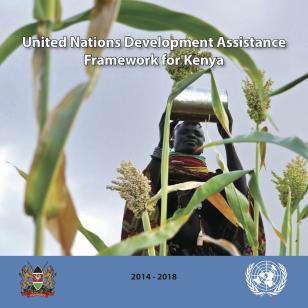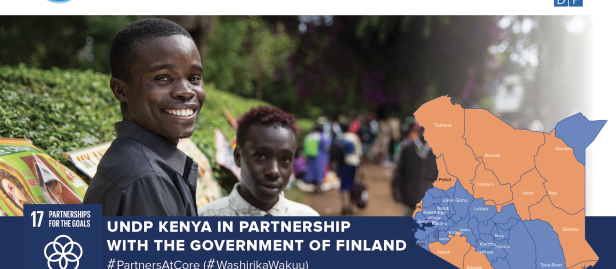United Nations Development Assistance Framework 2014-2018

United Nations Development Assistance Framework 2014-2018
June 6, 2014
The United Nations Development Assistance Framework (2014-2018) for Kenya is an expression of the UN’s commitment to support the Kenyan people in their self-articulated development aspirations. This UNDAF has been developed according to the principles of UN Delivering as One (DaO), aimed at ensuring Government ownership, demonstrated through UNDAF’s full alignment to Government priorities and planning cycles, as well as internal coherence among UN agencies and programmes operating in Kenya.
The UNDAF narrative includes five recommended sections: Introduction and Country Context, UNDAF Results, Resource Estimates, Implementation Arrangements, and Monitoring and Evaluation as well as a Results and Resources Annex1.
The processes behind the formulation of UNDAF 2014-2018 were extensively participatory and interactive and focused on areas in which the UN Country Team (UNCT) is best positioned to contribute. Formulation was guided by the UNDG Preparation Guidelines, the Quadrennial Comprehensive Policy Review (QCPR-2012) and the 2010 Guidance Note on the application of UN Country Programming Principles to the UNDAF.
Developed under the leadership of the Government, the UNDAF reflects the efforts of all UN agencies working in Kenya and is shaped by the five UNDG programming principles: Human Rights-based approach, gender equality, environmental sustainability, capacity development, and results- based management. The UNDAF working groups have developed a truly broad-based Results Framework, in collaboration with Civil Society, donors and other partners.
The UNDAF has four Strategic Results Areas: 1) Transformational Governance encompassing Policy and Institutional Frameworks; Democratic Participation and Human Rights; Devolution and Accountability; and Evidence-based Decision-making, 2) Human Capital Development comprised of Education and Learning; Health, including Water, Sanitation and Hygiene (WASH), Environmental Preservation, Food Availability and Nutrition; Multi-sectoral HIV and AIDS Response; and Social Protection, 3) Inclusive and Sustainable Economic Growth, with Improving the Business Environment; Strengthening Productive Sectors and Trade; and Promoting Job Creation, Skills Development and Improved Working Conditions, and 4) Environmental Sustainability, Land Management and Human Security including Policy and Legal Framework Development; and Peace, Community Security and Resilience. The UNDAF Results Areas are aligned with the three Pillars (Political, Social and Economic) of the Government’s Vision 2030 transformational agenda.
The UNCT estimates that approximately $(US) 1.2 billion (for both humanitarian and development assistance) will be needed over the 2014-2018 four-year period to achieve the 13 UNDAF outcomes. This includes the financial resource allocations that UN agencies will receive and the funds that they expect to mobilize from external sources.
The UNCT, under the leadership of the UN Resident Coordinator, will be responsible for the implementation of the UNDAF for the 2014-2018 period. Under the DaO “One Leader” approach the Resident Coordinator and the UN Country Team will be responsible for the oversight of the Results Groups, the Operations Management Team and the Country Communications Group. The National Steering Committee (NSC) will directly oversee the One Budgetary Framework and Programme.
The Republic of Kenya, the UN System and donors will work together in the spirit of partnership to implement the UNDAF, as a contribution to the achievement of national development goals and aspirations and as a concrete step towards the realization of Kenya’s developmental commitments to its people and the international community.

 Locations
Locations